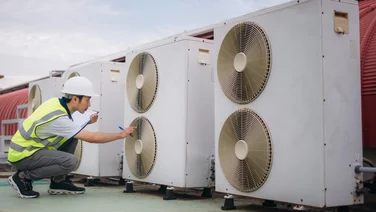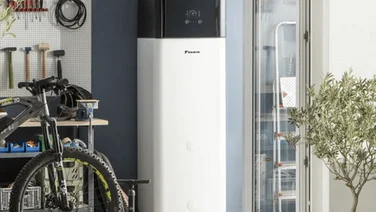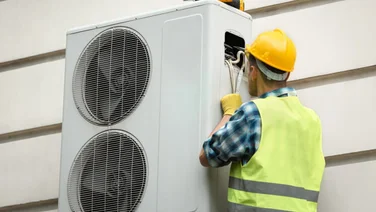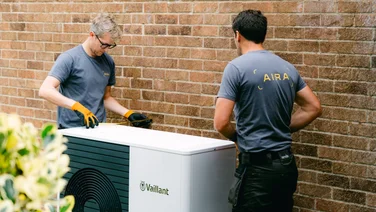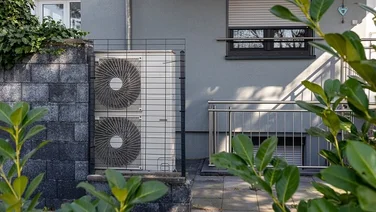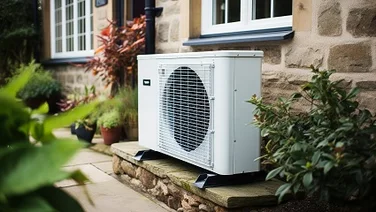We receive a small fee from trusted installers when you request a quote through our site. This helps us keep our content independent, well-researched and up to date – Learn more
- A heat pump will increase your electricity bill, but not by as much as you think
- The best electricity tariffs let you run a heat pump more cheaply than a boiler
- Also keep running costs low by opting for a highly efficient heat pump and professional installation
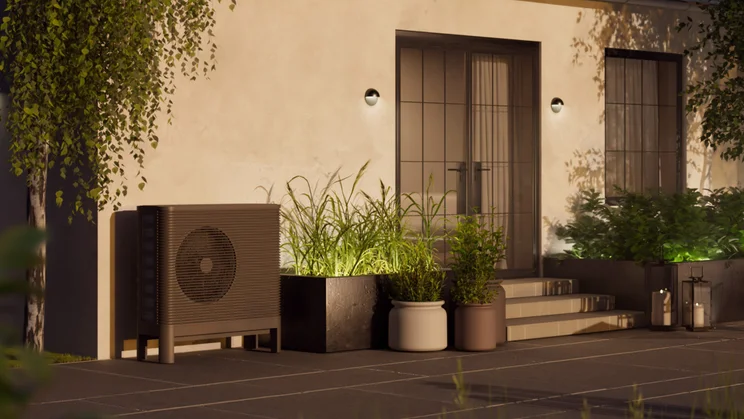
One of the biggest barriers to the uptake of heat pumps in the UK is the fear that they cost a fortune to run.
Tabloids love to push this angle, pointing out that electricity costs more than gas. Heat pumps run on electricity and boilers run on gas, so it must be cheaper to use a boiler – right?
Not necessarily. In fact, with the right electricity tariff, a heat pump can be significantly cheaper to run than a gas boiler.
The Energy Saving Trust calculates that switching from a conventional boiler to a heat pump could reduce your heating bills by £340 a year.
Octopus Energy goes further, telling us: “A typical home with an Octopus Cosy heat pump installed could save up to £380 a year.”
In this article, we’ll take a closer look at this claim and reveal how you really can run a heat pump more cheaply than a boiler – without having to go cold.

Get £7500 towards your heat pump installation through a trusted installer
An MCS-certified heat pump installer can apply for the Boiler Upgrade Scheme on your behalf, get a quote from one now
How much does a heat pump cost to run?
On the face of it, a heat pump costs slightly more than a boiler to run. This is because electricity (which heat pumps use to run) costs more than gas (which most boilers use to run).
However, a heat pump uses much less energy than a boiler to produce the same amount of heat. As a result, running costs are not wildly different.
Under the current Ofgem price cap, an average household using a gas boiler for heating would pay around £70 per month. A similar-size household using an air source heat pump would spend around £80 per month to run it.
Here’s an illustration. The energy use figures are the average monthly usage for a 2-3 bedroom home according to Ofgem (for a boiler) and Octopus Energy (for a Cosy 6 heat pump):
| Heating method | Average monthly usage | Ofgem price cap 2025 | Standing charge | Monthly bill |
|---|---|---|---|---|
| Gas boiler | 960 kWh gas | 6.29p/kWh | 34.03p/day | £60.72 |
| Heat pump | 246 kWh electricity | 26.35p/kWh | 53.68p/day | £65.36 |
Those figures don’t tell the full story, though. Here are a few factors they fail to take into account:
The Ofgem price cap is not what you actually pay
It’s the maximum your energy supplier can charge on a standard variable tariff. Suppliers generally undercut it – and the biggest undercutting is by special “heat pump tariff” deals that charge significantly less than the price cap.
Heat pumps are more efficient than boilers
Heat pumps are more efficient than even the newest A-rated boilers. The more efficient a heating system is, the cheaper it is to run.
Heat pumps last much longer than boilers
The average heat pump has a lifespan of 20 years, compared with 10 years for a boiler. If you opt for a heat pump, you won’t have to pay to replace it in a decade.
You can ditch your gas supply
With a boiler, you have to use electricity as well, so you pay the electricity standing charge. With a heat pump, you could get rid of your gas connection completely and not be liable for gas standing charges.
Let’s now take a closer look at all these factors.
Heat pumps cost a lot more than boilers to install. That’s partly because switching you from a fossil fuel heating system to an electrically-powered one is a significant job. Most of the cost of your initial heat pump installation goes towards it.
Government grants currently cover most of the cost, provided your heat pump is installed by an MCS-accredited professional.
Your installer will automatically subtract the £7,500 Boiler Upgrade Scheme grant, leaving you with around £4,000 to pay – which isn’t far off the average price of a new gas boiler.
How does efficiency affect running costs?
The efficiency of your heating system is really important here. It dictates how well the system converts energy (gas or electricity) into energy (heat for your home).
Heat pumps are much more efficient at this than gas boilers. The average heat pump has an efficiency rating of around 300%. That means it produces around three times the energy it uses. The average gas boiler, by contrast, has an efficiency rating of just 82%, so it produces less energy than it uses.
The Energy Saving Trust has calculated that a heat pump costs a mere £14 a year more to run than a new A-rated gas boiler – but £340 less to run than an older G-rated boiler.
Your old boiler is basically burning your money.
The most efficient heat pumps cost the least to run, because they produce much more energy than they use.
Make sure you ask your heat pump installer about different heat pumps’ efficiency ratings, aka SCOP (Seasonal Coefficient of Performance) ratings, when you’re discussing which model to get.
For example, the 13kW model of the Grant Aerona3, our pick for ‘most efficient’ in our best heat pumps list, has a market-leading SCOP of 5.40 (efficiency rating of 540%) in “average climate conditions”. That means it will produce more than five times the energy it takes to run.
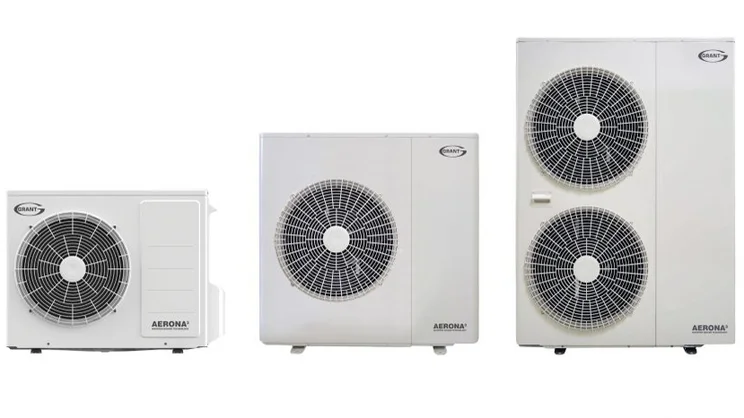
The 6kW model of the same heat pump has a SCOP of 4.61 in ideal conditions. When it’s extremely cold out, its efficiency will be lower.
For instance, the 5kW Mitsubishi Ecodan R290 has a SCOP of 4.42 (442%) in temperatures down to -35°C, and 3.38 (338%) in temperatures down to -55°C.
As technology evolves, heat pumps are getting more and more efficient. This will make their running costs fall even further in future.

How does a tariff affect heat pump running costs?
The right electricity tariff could slash thousands off the annual bill for running your heat pump.
Special heat pump tariffs offer the biggest savings. These tariffs, such as Octopus Energy’s Cosy Octopus and Aira’s Clean Energy tariffs, are often much lower than Ofgem’s price cap. They’ve motivated many customers to switch to a heat pump.
There are two main types of heat pump tariff:
1. Time-of-use tariffs offer super cheap electricity rates at off-peak times such as early in the morning and mid-afternoon. These tariffs are ideal if you’re home during the day, or your home is insulated well enough to retain all the heat from running your heat pump off-peak.
The Cosy Octopus tariff, which also powers the Aira Zero tariff, is a time-of-use tariff. Other examples include Good Energy’s Heat Pump Tariff and EDF Energy’s Heat Pump Tracker.
2. Type-of-use tariffs charge lower electricity rates to run your heat pump than for, say, your fridge and kettle. OVO Energy’s Heat Pump Plus is a type-of-use tariff. This would be your ideal type of tariff if you get home from work in the early evening and want to run your heat pump then.
The best heat pump installers can help you choose the best heat pump tariff for you.
How much do heat pumps cost to run under these tariffs?
Heat pump tariff rates are much lower than the price cap during special off-peak hours or for running heat pumps, but may be higher for peak times and other electricity usage.
The exact rates charged vary slightly according to the area you live in. You should be able to check the rates you’d currently pay by going to your supplier’s (or potential new supplier’s) website.
I entered my Southampton postcode into the Cosy Octopus rate-checker to get an idea. I’d pay an off-peak “Cosy rate” of 14.09p/kWh – more than 11p below the price cap – and a day rate of 28.74p/kWh.
The main downside is the high peak rate of 43.11p/kWh charged between 4pm and 7pm. You’d have to ensure you run your heat pump outside of these hours. I work from home and my house is well insulated, so I’d be happy to just use Cosy hours.
Now let’s try those heat pump vs boiler calculations again, using the Cosy rate:
| Heating method | Tariff | Avg monthly usage | kWh unit price | Standing charge | Monthly bill |
|---|---|---|---|---|---|
| Gas boiler | Ofgem price cap | 960 kWh gas | 6.33p | 29.82p/day | £68.95 |
| Heat pump | Cosy Octopus | 246 kWh electricity | 14.09p | 43.94p/day | £47.84 |
That’s a whopping saving of £21.11 per month if you opt for a heat pump, adding up to £253.32 per year.
If your boiler is particularly old and inefficient, the savings could run to many times that.
Not unless you have a massive solar PV system. A typical 3.5 kWp solar PV system will cut your heat pump running costs by about half, however.
According to our solar output calculator, the average three-bedroom house uses 2,700 kWh of electricity per year. A home with a heat pump would use around 4,000 kWh or more.
So your panels are unlikely to power it completely, but they would make a big dent in your electricity bills – especially if you investigate special “heat pump plus solar” tariffs, such as the Aira Solar Export.
READ NEXT: Can you power a heat pump with solar panels?
How else can I cut my heat pump running costs?
High-quality installation by an MCS-certified company is vital if you want your heat pump to work properly – and to keep you warm without ramping up your bills.
The best heat pump installers understand how to maximise your heating efficiency and energy savings.
They will also be able to advise on any essential home improvements such as insulation. These updates can make all the difference to your heat pump running costs. In addition, they can help you avoid extra costs by installing a heat pump that works with your existing radiators.
For more help on hiring an installer, read our article on how to choose a heat pump installer. If you’re ready to collect quotes, pop a few details into our heat pump quotes tool and we’ll ask a few trusted installers to get in touch.

